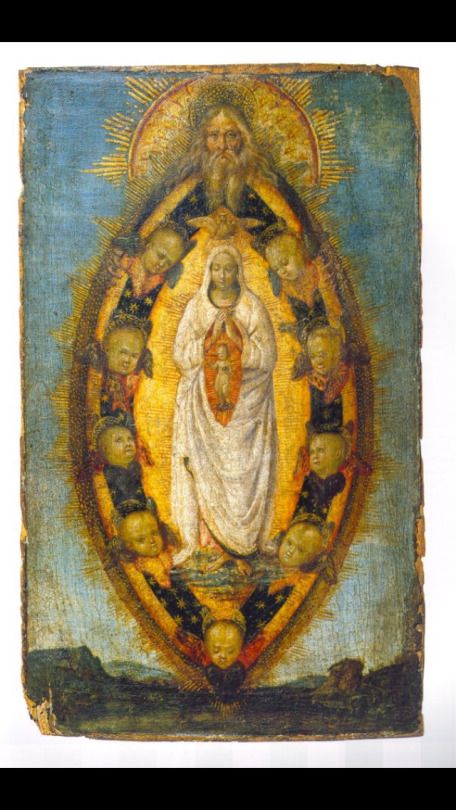Romanism
&
Islamism
Romanism - Officially recognized
Latin
Islamism - Officially recognized
Arabic
Romanism - Main Country is Italy, a Peninsula facing to the
West
Islamism - Main Country is Arabia, a Peninsula facing to the
East
Romanism -
Sunday worship, first day of the week -
Catechism of the Catholic Church - The third commandment
Islamism -
Friday worship, sixth day of the week -
Al Jumu'ah 62:9-10
[JEHOVAH's is the Holy 7th day the Sabbath of the LORD Jesus, Exodus 20:8-11 KJB]
Romanism - Sun/moon monstrance in which the 'eucharist/host' is kept
Islamism - Moon/Sun/or star symbol
Romanism - 8 pointed star being a symbol of RC 'Mary'
Islamism - 8 pointed star in Islam
Romanism - Jerome's corrupted Vulgate [corrupted the true vulgate, the Italic], corrupted Sinaiticus, Vaticanus
Islamism - Abu al Qasim's corrupted qur'an [corrupted with gnostic, talmudic, sources, etc]
Romanism - Creeds, so-called 'church fathers', papal bulls, encyclicals, briefs, etc.
Islamism - aHadiths, Sunnah, Tafsirs, Sharia [Islamic laws]
Romanism - [Roman] Canon Law [natural law]
Islamism - Sharia [Islamic law]
[JEHOVAH's Ten Commandments, Exodus 20:1-17 KJB]
Romanism - a combined Religion/State power
Islamism - a combined State/Religion power
[the state and church are to be in their respective spheres, see Romans 13]
Romanism - RC 'Mary' highly exalted to co-Mediatrix, hyper-dulia, etc and Immaculate conception dogma
Islamism - Islamic 'Mary', see qur'an Maryam 19, and aHadith in which 'Mary' is 'not touched by satan'
Romanism - gnostic connections, Shepherd of Hermas, Thomasine, Judasine, etc
Islamism - gnostic connections, 'infancy gospel of thomas', etc. baby 'Isa' speaks from under the womb, and cradle, and makes clay birds come to life, etc
Romanism - continuing 'Mass', the unbloody sacrifice
Islamism - continuing bloody animal sacrifices
Romanism - no victory over sin, the Auricular confessional, penances, etc [works salvation, fasting, rosaries, etc]
Islamism - no victory over sin, works salvation, the as-salat, wudu, fasting, pilgrimaages, etc
Romanism - War - Crusades, Inquisition - aka Office/Curia of Congregation for the Doctrine of the Faith
Islamism - War - Jihad, a qur'an
Al Tawbah or Bara'ah 9:5,29, etc
Romanism - Vatican, Ultramontanism, all power in one man, popery
Islamism - Caliphate, all power in one man, Mahdi, etc. a qur'an
Al Nisa' 4:65, Al Ahzab 33:36
Romanism - Pope's sayings, councils sayings, traditions of men
Islamism - Muhammad's sayings [aHadith], traditions of men
Romanism - another Intercessor, RC 'Mary', the co-Mediatrix, co-Redemptrix, Popes, Priests, 'Saints', etc
Islamism - Abu al Qasim
Romanism - Important women, RC 'Mary', 'Fatima' [city, so-called miracle site]
Islamism - Important women, Islamic 'Mary', Maraym 19, Fatimah the daughter of Abu al Qasim [Muhammad]
Romanism - monkery, monasticism, etc
Islamism - Khadija, Waraq bin Naufal, Nestor [Baeira, Pakhyras, Sergius the monk] see Hayatu'l-Qulub' by Abu Talib, or Al-Asbahani, Dala'il al-Nubuwah 1:173, or see the Jami' al-Tawarikh by Rashid al-Din Hamadani published in Tabriz, Persia, or see Ibn Hisham, Ibn Sa'd al-Baghdadi, or Muhammad ibn Jarir al-Tabari, or even just plain old Yusuf Ali notations on Baeira.
Romanism - Pilgrimmages to Fatima, Lourdes, Vatican, Guadalupe, etc
Islamism - Pilgrimmages, the greater and lesser hajj to Mecca, Medina, Jerusalem, Ka'ba, etc.
Romanism - state of the dead - immortal soul/spirit theology, same as pagans, occult
Islamism - state of the dead - immortal soul/spirit theology, same as pagans, occult
Romanism - purgatory, limbo, etc
Islamism - Barzakh, a waiting place on the other side of the as-sirat bridge, until judgment day
Romanism - Eternal torments in hellfire/lake of fire, a never-ending, always increasing torment
Islamism - Eternal torments [especially for women, as they are the ones to fill hell mostly] in a hellfire/lake of fire, always increasing, never-ending, in Islam there are 7 levels of Hell [Jahannam; Jahim, Jahannam, Sa'ir, Saqar, Ladha, Hawiyah, Hutamah]
[Bible [KJB] teaches 2nd death, oblivion, dead and gone forever, no life, burnt up into smoke and ashes in the flames on earth before being made new, see Revelation 20, etc]
Romanism - Nuns/Habits/Monks/Cloistered
Islamism - Hijab, Burkha, women cannot work, must stay in the house in a single room [a few exceptions], etc.
Romanism - special exorcists
Islamism - special exorcists, called the ruqyah; al-Tibb al-Nabawi
Romanism - beads, 'the Rosary', the vain repetitious prayers, also monk chants, breath prayers, desert 'fathers' mysticism, etc, to deaden the mind, allowing more access to the voice of satan:
"...as though they were listening to the very voice of the Blessed Mother explaining the mysteries and conversing with them at length..." [ON THE ROSARY; MAGNAE DEI MATRIS; Encyclical of Pope Leo XIII promulgated on September 8, 1892.]
Islamism - beads, the Misbah, Tasbih, Sibha, having the same effect to deaden the mind, allowing more access to the voice of satan
Romanism - Cantor, Intonation, Gregorian Chants
Islamism - Muslim chants, qur'anic intonation [which means recitation]
Romanism - earthly sanctuary at the Vatican, the Mass in Rome
Islamism - earthly sanctuary, the Ka'baa in Mecca
Romanism - Indulgences, forgiveness of sins, kising pope's feet, Yoni imagery (Jesus, the Stone, central) throughout, etc
Islamism - sins forgiven by 'good' [meaning Islamic] deeds, which wipe out 'bad' [means Islamic] deeds, kissing the idolatrous black stone inside the Yoni corner.
Romanism - Washings for the Mass, with specifications, etc
Islamism - Wudu, religious washings, with specifications, etc
Romanism - claim earthly Jerusalem [a forever desolate city] for Catholicism
Islamism - claim earthly Jerusalem [a forever desolate city] for Islamism
[JEHOVAH's eternal city, the New Jerusalem is above, Galatians 4:26 KJB, coming down from Heaven, Revelation 21:2, for here we have no continuing city, Hebrews 13:14 KJB]
Romanism - Captial - Rome, the self-styled and so-called 'eternal city'
Islamism - Captial - Mecca
[JEHOVAH's eternal city, the New Jerusalem is above, Galatians 4:26 KJB, coming down from Heaven, Revelation 21:2, for here we have no continuing city, Hebrews 13:14 KJB]
Romanism - false understanding of angels, Michael, Gabriel and other numerous named angels in their sources, sandalfon, metatron, salthiel, saraquel, raphael, etc.
Islamism - false understanding of angels, Michael, Gabriel and other numerous named angels in their sources, Israfel, etc.
Romanism - Visionaries - Ignatius Loyola, etc [in a Cave]
Islamism - Visionaries - Abu al Qasim [in a Cave, Hira]
Romanism - private killer assassins, political rebellion creators, the Jesuits, Dominicans, Opus Dei, etc
Islamism - Hashashins [assassins]
Romanism - Religious Calendar - Lent, Easter, etc, etc.
Islamism - Religious Calendar - Ramadan, etc, etc.
Romanism - pagan practices accepted or taken over and 'baptized', all-saints day, equinoxes, etc
Islamism - pagan practices, circling the Ka'baa, throwing stones at the shaytan, etc.
Romanism - unscriptural food and drink allowances and forbidances [Leviticus 11; Deuteronomy 14; Acts 15; 1 Timothy 4:3 KJB]
Islamism - unscriptural food and drink allowances and forbidances, under Abu al Qasim's Halal and Haram [and Makrooh]
Romanism - etc. add your own
Islamism - etc. add your own
The two are mirrored of each other, a yin and yang, a so-called 'light' and 'dark', both in great error, yet the one [Islam] came out of the other (to be demonstrated in detail later), an attempt at an early ecumenical [Mecci] endeavor, that failed [Medini].



